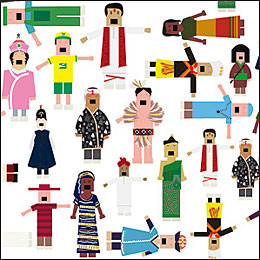
The basis for his argument is that the desire to keep these remote languages, such as the recently-extinct Eyak language, which had been spoken in Alaska, alive and in use is the product of purely aesthetic motives. Basically, keeping a language alive does not keep a culture alive and a culture does not completely die off when its language is considered dead. The argument is quite cogent and the article is well worth a read.
However, I do have to disagree with some of what he said. The first is that reducing the desire to preserve languages that are moving toward extinction is not merely an “aesthetic” approach. Mr. McWorther alludes to the idea that imperialism and expansionism are the ugly forebearers of today’s hegemony of English around the globe. But it would appear that he doesn’t appreciate how crucial it is to the psyche of people whose native language has not traditionally been English. Though the fact that knowledge of English is so prevalent throughout the world means that there are billions of potential readers of this blog, but when it reaches the point of obliterating the traditional local language (and this applies to any dominant language in a region, of course), then it is NOT simply a matter of aesthetics; instead it is yet another example of the wasteful destruction of indigenous resources through the philosophy of “might makes right” (here: we dominate you culturally, so you must abandon everything your culture has built over centuries).
Granted, my approach is a bit romantic and the more pragmatic and realistic perspective would be that unifying global communication through the proliferation of English benefits more people throughout the world than isolating people with language barriers. But I also believe that it is undeniably true that the development of languages over the course of centuries is a reflection of a volksgeist that cannot be brushed away with the notion of aesthetics.
For now, I will leave my thoughts at that…I have a feeling I will return later with more.





